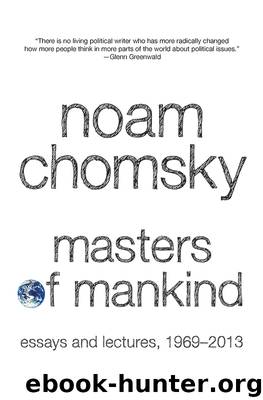Masters of Mankind by Noam Chomsky

Author:Noam Chomsky
Language: eng
Format: epub, azw3, mobi
Tags: Current Affairs, ebook
ISBN: 978-1-60846-425-8
Publisher: Haymarket Books
Published: 2014-09-01T16:00:00+00:00
* From “Consent without Consent: Reflections on the Theory and Practice of Democracy,” Cleveland State Law Review, vol. 44, no. 4 (1996).
Five
Simple Truths, Hard Problems: Some Thoughts on Terror, Justice, and Self-Defense *
To dispel any false expectations, I really am going to keep to very simple truths, so much so that I toyed with suggesting the title “In Praise of Platitudes,” with an advance apology for the elementary character of these remarks. The only justification for proceeding along this course is that the truisms are widely rejected, in some crucial cases almost universally so. And the human consequences are serious, in particular with regard to the hard problems I have in mind. One reason why they are hard is that moral truisms are so commonly disdained by those with sufficient power to do so with impunity, because they set the rules.
We have just witnessed a dramatic example of how they set the rules. The last millennium ended, and the new one opened, with an extraordinary display of self-adulation on the part of Western intellectuals, who praised themselves and their leaders for introducing a “noble phase” of foreign policy with a “saintly glow,” as they adhered to “principles and values” for the first time in history, acting from “pure altruism,” following the lead of the “idealistic new world bent on ending inhumanity,” joined by its loyal partner who alone comprehends the true nobility of the mission, which has now evolved even further into the “Bush messianic mission to graft democracy onto the rest of the world”—all quoted from the elite press and intellectuals. I am not sure there is any counterpart in the none-too-glorious history of modern intellectual elites. The noblest achievement was a “normative revolution” in the 1990s, which established a “new norm in international affairs”: the right of the self-designated “enlightened states” to resort to force to protect suffering people from evil monsters.1
As anyone familiar with history knows, the normative revolution is not at all new; it was a constant refrain of European imperialism, and the rhetorical flights of Japanese fascists, Mussolini, Hitler, Stalin and other grand figures were no less noble, and quite possibly just as sincere, so internal documents reveal. The examples given to justify the chorus of self-acclaim collapse on the slightest examination, but I would like to raise a different question, bearing on how rules are established: why was the “normative revolution” in the decade of the 1990s, not the 1970s, a far more reasonable candidate?
The decade of the 1970s opened with the Indian invasion of East Pakistan, saving probably millions of lives. It closed with Vietnam’s invasion of Cambodia, ousting the Khmer Rouge just as their atrocities were peaking.
Before that, State Department intelligence, by far the most knowledgeable source, was estimating deaths in the tens or hundreds of thousands, not from “mass genocide” but from “brutal rapid change”—awful enough, but not yet approaching the predictions of high US officials in 1975 that a million people might die as a result of the earlier years of bombing and atrocities.
Download
Masters of Mankind by Noam Chomsky.azw3
Masters of Mankind by Noam Chomsky.mobi
This site does not store any files on its server. We only index and link to content provided by other sites. Please contact the content providers to delete copyright contents if any and email us, we'll remove relevant links or contents immediately.
The Secret History by Donna Tartt(19025)
The Social Justice Warrior Handbook by Lisa De Pasquale(12182)
Thirteen Reasons Why by Jay Asher(8883)
This Is How You Lose Her by Junot Diaz(6869)
Weapons of Math Destruction by Cathy O'Neil(6260)
Zero to One by Peter Thiel(5782)
Beartown by Fredrik Backman(5733)
The Myth of the Strong Leader by Archie Brown(5491)
The Fire Next Time by James Baldwin(5422)
How Democracies Die by Steven Levitsky & Daniel Ziblatt(5210)
Promise Me, Dad by Joe Biden(5139)
Stone's Rules by Roger Stone(5078)
A Higher Loyalty: Truth, Lies, and Leadership by James Comey(4946)
100 Deadly Skills by Clint Emerson(4911)
Rise and Kill First by Ronen Bergman(4775)
Secrecy World by Jake Bernstein(4737)
The David Icke Guide to the Global Conspiracy (and how to end it) by David Icke(4696)
The Farm by Tom Rob Smith(4500)
The Doomsday Machine by Daniel Ellsberg(4481)
